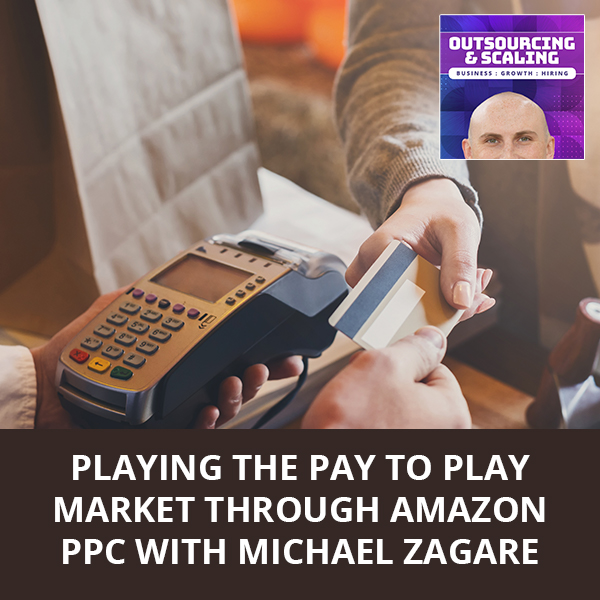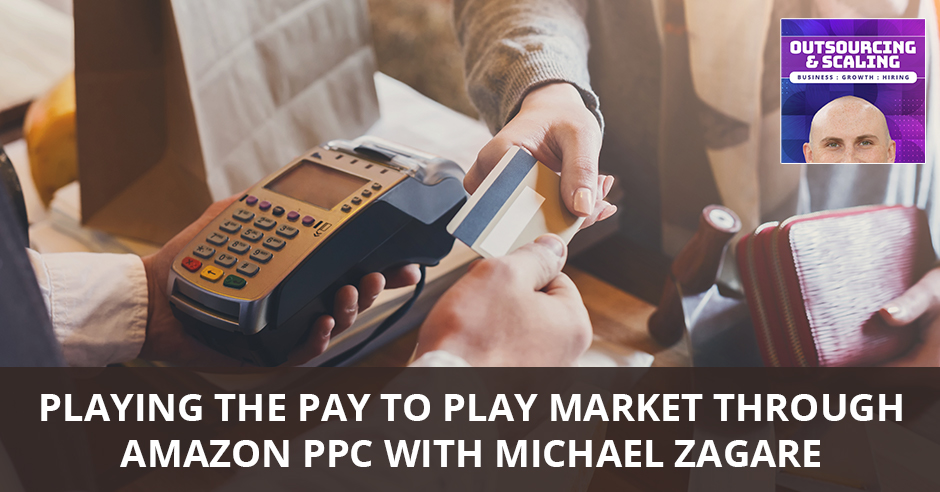


With Amazon becoming a pay-to-play marketplace, Amazon PPC has become such a huge topic. Michael Zagare says there are so many benefits as long as you know what you’re doing on PPC. Michael is a serial entrepreneur, a recovering physical therapist, and the Founder of PPC Entourage. With his never ending quest for knowledge and everything Amazon, he loves sharing what he has learned to other sellers to guide them through their journey to financial and personal freedom. In this episode, he shares how he was drawn to the world of PPC as well as how advertising has evolved and is evolving. He also talks about how he handles his growing company through delegating and outsourcing.
—
Listen to the podcast here:
[smart_track_player url=”https://www.podetize.com/statsapi/www.podetize.com/wp-content/uploads/fileuploads/11-5b145ef137b51b3d1af0633e9305c43d/10/2019/e649e45337bf0b6085c257464eda026b.mp3″ title=”Playing The Pay To Play Market Through Amazon PPC with Michael Zagare” artist=”Nathan Hirsch” image=”https://freeup.net/wp-content/uploads/2019/04/OAS.png” ]
Download the audio file here.
Playing The Pay To Play Market Through Amazon PPC with Michael Zagare
My guest, Mike Zagare. Mike, how are you doing?
I’m doing fantastic, Nate. Thanks for having me on. Excited to be here.
We’re excited to have you. I always love talking about Amazon PPC, it’s a huge topic. Amazon has become pay to play marketplace.
Yes, you got to pay to play and there are so many benefits as long as you know what you’re doing on PPC. Once again, glad to be here and ready to rock.
Mike is a serial entrepreneur, a recovering physical therapist. I find that hilarious because I almost became a physical therapist. I did one internship and I lasted about a week before I said, “That was so boring, I never want to do this again.” He’s the Founder of PPC Entourage and using the same tactics and strategies he shares, through Entourage he scaled his business to seven figures in less than seven months. Mike has an unquenchable thirst for knowledge and all things Amazon and love sharing that knowledge with other sellers to help them take steps towards personal and financial freedom, which we are all about. We’re going to talk all about that, but let’s take a gigantic step back. What were you like growing up? Were you a rebel? Were you a straight-A student? I know you wanted to become a physical therapist so I’m assuming you got good grades at some point.
I wasn’t quite the rebel that some entrepreneurs are. I did follow the system, I did get decent grades. I was a B student and I had to try to become a B student. Without studying and all that stuff, I’d probably be a C student. At some point, I didn’t fit the mold and when I went to college, it was one of the most stressful times of my entire life. Someone said, “Go to college, do your thing.” I’ve hit physical therapy but I’m so young. It was so stressful that my hair was falling out at the age of sixteen, seventeen or eighteen. I said, “This doesn’t feel right.” I lasted about eight years and 51 weeks older than you did in physical therapy. I started a business in that field but I quickly realized that it was not the space I want to be in. Then came Amazon, it was a great opportunity that came and found me.
How did you come across Amazon? What year was that and how was it like?
Find the right people to do things that you are not good at.
It was 2015 and my physical therapy business was about six years in the making. It wasn’t profitable whatsoever. It was stressful, dealing with medical reimbursements and all that stuff. I started getting deep into personal development and my mindset work. Getting up early and doing meditations, all the affirmations. I was looking for an opportunity. I hired a coach, his name is Jeffrey Collins. He said, “You have a lot of juice but you’re spinning your plates in the wrong area. I see you in importing and exporting.” I said, “What the heck do you mean? What the heck is that? I’m a physical therapist.” Three days later, I’m sitting on my couch scrolling through Facebook about ready to go to the gym but it was pouring outside. I looked through Facebook and I see something for eBay, retail arbitrage and drop shipping. I was like, “What is this?” I followed that site and it went from one thing to the next and got introduced to Amazon FBA. I made a ton of mistakes along the way, started a lot of unprofitable ventures but kept on digging. I kept on going forward and that landed me to my first product which was a success, thankfully.
Amazon has a wide range. You’ve got writing listings, PPC. What was it about PPC that drew you into it?
I had a lot of success in late 2015 with PPC. That was the beginning of PPC, when it was just coming out and people were trying to use it more. It was like the Wild Wild West of PPC where you can throw in thousands of keywords, see what stuck and get thousands, even millions of impressions. We had this crazy shotgun approach where we took all these keywords from merchant words and these different search terms tools and we started making all these campaigns. I started seeing a lot of results. Back then, words were not as expensive as they are now. Amazon has gotten more sophisticated with their algorithms. You can’t do that anymore, but at the time it was working well. We were able to scale things but I realized that it’s not going to work this well forever. What can I do to systematize this and turn this into something that I don’t have to spend ten hours a week on? I always spent ten hours a week doing PPC, learning the ins and outs, doing the whole thing but I wanted a way to make it faster and more efficient. I built a blueprint that I follow, then we turned that blueprint into a software which is now PPC Entourage.
What changes have you seen? I started back on Amazon in 2009, PPC didn’t even exist. What are you seeing that’s changing? I feel like there’s a lot of stuff, we just got to the beginning of PPC.
It’s still the infancy of PPC but there are a lot of changes. In late 2018, there was all sorts of opportunities. There was product targeting, bid adjustments based on placement. There were going to be changes to sponsored brand in the ads if that’s correct. I feel like that’s a great opportunity to get in there and dig in. Create some good headlines or what we call headline search. There has been a ton of changes along the way but it continues to change. Even with automatic campaigns, they show you exactly the placement of those campaigns, where they’re placing you and how you’re doing based on that placement. That’s a big change. Also, being more specific in the keywords as you’re targeting. If you’re going for tons of keywords like we did back in the day, that’s not good.
You have to be more precise with your bidding, more precise with the targets that you’re going after whether that be a keyword and know that it’s going to be more expensive than it used to be. The other thing that we’re noticing is being aggressive with PPC can have a substantial impact and benefit on your organic placement, ranking. We measure the organic sales and the PPC sales, even if we have a higher ACoS, where we used to think this is not beneficial because the ACoS is too high. Knowing how that impacts our organic sales and knowing that our ad spend margin impact is within a normal range for us, we’re cool with that. We’re getting more advanced. We’re not looking at just ACoS, we’re looking at a bunch of different things and Amazon is becoming more advanced as well.

How are you seeing people outsource to growing their Amazon business, whether it’s in your software or without it, virtual assistants or freelancer specialist or even high-level strategists and agencies?
Part of that is first determining what my value is and how much I want to make per year. I was doing this exercise, I don’t make $1 million in salary but I want to. I asked myself, “If I want to make a $1 million a year in salary, how much is that going to have to be per hour?” It works out to be about $500 per hour. If I know that number, it makes it easier to delegate tasks that are not worth $500 per hour. Any task that is not worth that is worth delegating. It’s questionable whether or not PPC is worth $500 an hour because that’s a high value task. If it’s done the right way you can get all of the benefits of organic ranking and help steam roll everything in the right direction.
I do think PPC is a valuable task, although you can outsource that if it’s not your area of specialty. You want to focus on areas that you specialize in or good at. Things like keyword research, knowing things to target, looking for keyword opportunities. I love to outsource that. Digging into the search term reports to find new opportunities that have connected with our audience, then placing those search terms into our listing. Outsourcing and the process of developing the listing is something that I don’t want to do personally, there are a lot of people out there who can do it better than me. For me, my job is to get clear in my mindset and allow for opportunities and ideas to flow, then find the right people to plug in the pieces that do things that I’m not as good as they are.
Let’s flip the switch, you’re growing a software company, it’s not easy. Talk to me about your team that you built. Who else do you have? Are you guys remote? Are you using US people, non-US people? Walk us through that.
We are 100% remote. My business partner and I have been friends since first grade. He lives about five miles away. We get together and have business meetings. I work from home and I’m a Starbucks junkie. I will do everything from Starbucks or coffee shops throughout the world. That is the way I wanted to design my own personal life because I love to travel. As long as there’s a Wi-Fi signal, I get to do what I need to do. We have structured meetings throughout the day where we get together with people on our team. We have a pretty big team at this point, over 25 people. Some are part-time, some are full-time, some are freelancers.
What we do is we have a system and structure in place where we make sure that we hit every single thing across those meetings. We have team for our content and we meet on Mondays. We have a team for our development and we go over visionary management, the different tools that we want to come out and feature. My personal job is strictly to get clear on what I think is going to be great feature for Amazon sellers and communicate that to my team and get those people in place. That’s the development team. We also have the management team where we get together and go over, how are we going to steer the ship? Where do we want to focus our energy? What is the next best opportunity to grow this SaaS company? There are various other things but for the most part those are the three major meetings that we have every single week. It’s my job to find good, high-quality people to fill the roles that I’m not comfortable in and let them do their thing.
One of the benefits of hiring a remote hiring agency is that there are lots of other people to choose from.
That’s where a lot of entrepreneurs get lost. It’s one thing to say, “I’m going to hire someone for something I’m not good at,” but they struggle to vet those people. As someone who has hired a lot of people and probably made some great hires and some not so great hires, how do you vet and find people that will be a good fit for your business?
I am not the best at hiring. I’m getting better at letting people go faster. That to me is critical. There are certain areas where we are not quick to hire anymore. We used to be too quick to hire, especially in software development because I didn’t know much about that. I didn’t even know what a bug was when I started PPC Entourage. I’m a recovering physical therapist. I would go by what the guy said, “I trusted that person and we hired too fast.” We learned later on there are certain skillsets that we didn’t know that this guy had to have. There were things that were red flags from the beginning that I didn’t listen to. Because of the position we were in at the time where we relied on that person too much, they had expertise that I didn’t have, we had to stick with that person for too long. Thankfully, we have a situation where we don’t have to stick with that person if they’re showing those red flags.
One of the benefits of hiring an agency like FreeeUp, is that there are lots of other people to choose from. If you don’t get along with somebody, you can go with somebody else. It’s that safety net that we didn’t have early on. I would say getting good at hiring, but getting even better at listening to your intuition and yourself as you’re going along. You’re listening to the red flag right away and letting people go sooner rather than later. We’ve held people on for too long and that’s something that we are all getting better at.
Talk to me about hiring developers. Personally, that is an area that I’ve struggled with for years, so much so that I had my business partner, Conner and me, I don’t even talk to my developers anymore. He’s in charge of hiring them and managing them. If I have a new idea, I’ll walk it through but he does all the communication because developers stress me out and I am not good at communicating with them. What tips can give about working with developers specifically?
The biggest challenge working with developers has been the communication. Communicating the vision over to that person. As long as they have the skillset, it’s up to us if we’re coming up with some good stuff to communicate that over to them appropriately. In doing so and learning, I’ve become clear at outlining exactly what I’m envisioning through lots of different images, graphics, bullet points and all that stuff. Organizing the heck out of everything, I call it cleaning. Before, I used to give them an idea. It was clear in my mind but not clear in their mind. That simply cost a lot of time, money and energy because the communication back and forth is never good. You have to start off with somebody who’s good in communication to begin with. We’ve had point people or communication people who are in charge of the project who weren’t good. It makes everything struggle because the communication isn’t there. If I had to give a tip, it’s to get your vision out as clearly as possible because they cannot read your mind and you are steering that ship. It’s in your mind, you know it’s going to be gold and valuable but you have to get that message across with your communication.
Let’s go back to PPC. Let’s say a six or seven-figure seller comes to you and says, “Mike, what is something that I might not know about PPC?” What would you tell them?
A lot of sellers are not leveraging some of the key optimization strategies that are out there like negative phrase match. That is an opportunity, I would look into that. Make sure that you’re clear on what you’re targeting and using negative phrase match is beneficial. We have found that has been helpful. The other thing is optimizing with a different mindset, look at certain things like, “How expensive is that keyword?” We have a tool inside of Entourage that shows you the cost per click per keyword. You go in there and see all of your keywords lined up by the highest cost per click. The keywords that used to be valuable to you a couple of years ago may not be as valuable to you right now. That’s one other way to optimize using a different strategy that’s working for us. The other thing is, know your end game. Know if this particular campaign is benefiting you in any other way other than having a certain ACoS.

For example, this person has a 30% ACoS, they want to go down to 20%. When we went in to their margins account, which is a software we released, it’s clearly showing that they are doing well on that product. They only have 6% ad spend margin impact. Cyndi Thomason from Profit First came out with a book, I highly recommend for all Amazon sellers. She goes over what the profit margins should be overall of your account, also on an individual product. By diving into that product, you can see what is left on the bone. How much can I spend towards PPC? Can I afford 10% ad spend margin impact that has a 60% ACoS or do I need to be at 40% ACoS and have a 6% to 8% ad spend margin impact? Knowing that clarity, especially as your SKUs become more diversified, when you start to expand and go into other markets, I can guarantee you guys that you have some SKUs that were profitable a couple of years ago that are no longer profitable. Digging into each individual SKU, yes, you can outsource this, but it’s up to the sellers to know exactly how much money they are making for each SKU.
Mike, this has been great. Anything else that I missed that you want to share with our audience?
I got a lot to share, this has been great. I would love to come back on and share some more. Thanks, Nate.
Where can people find you? What are you most excited about?
The Entourage Seller Community is available to anyone who wants to talk PPC or selling on Amazon. You can also email me at Mike@PPCEntourage.com.
Thanks, Mike.
Take care, Nate.
Important Links:
- PPC Entourage
- FreeeUp
- Entourage Seller Community – at Facebook
- Mike@PPCEntourage.com
About Michael Zagare
 Michael Zagare is a serial entrepreneur, a recovering physical therapist, and the founder of PPC Entourage. Using the same tactics and strategies he shares through Entourage, he scaled his business to seven figures in less than seven months.
Michael Zagare is a serial entrepreneur, a recovering physical therapist, and the founder of PPC Entourage. Using the same tactics and strategies he shares through Entourage, he scaled his business to seven figures in less than seven months.
Mike has an unquenchable thirst for knowledge in all things Amazon, and loves sharing that knowledge with other sellers to help them take steps towards personal and financial freedom.
